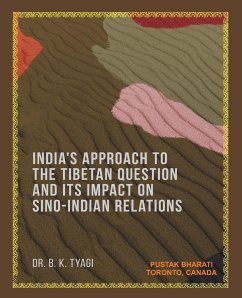
India's Approach to the Tibetan Question and its Impact on Sino-Indian Relations
Versandkostenfrei!
Versandfertig in 1-2 Wochen
18,99 €
inkl. MwSt.

PAYBACK Punkte
9 °P sammeln!
India's Approach to the Tibetan Question and Its Impact on Sino-Indian Relations examines the two pronged question of India's dealings with her two important neighbours leading up to a politico-historical debate. It is a known fact that India had a very liberal approach to its immediate neighbour and well-wisher Tibet, even at the cost of its relation with China. China had directly and indirectly reproached India for favouring Tibet against Chinese intrusion into the sovereignty of Tibet. Although India could not directly support the self-declared government of Tibet after the Chinese intrusio...
India's Approach to the Tibetan Question and Its Impact on Sino-Indian Relations examines the two pronged question of India's dealings with her two important neighbours leading up to a politico-historical debate. It is a known fact that India had a very liberal approach to its immediate neighbour and well-wisher Tibet, even at the cost of its relation with China. China had directly and indirectly reproached India for favouring Tibet against Chinese intrusion into the sovereignty of Tibet. Although India could not directly support the self-declared government of Tibet after the Chinese intrusion, the then Prime Minister of India, Pt. Jawaharlal Nehru had offered the Dalai Lama asylum, and the Tibetan refugees space and means of subsistence, which finally led to the Indo-Chinese war of 1962. Notwithstanding this, India has always looked towards Tibet with sympathy and care which had definitely impacted the Sino-Indian relations. The Tibetan government in exile is still functioning from McLeodganj, Dharmashala, Himachal Pradesh, India. The book tries to examine exactly these strained relations between the two strong nations owing to two diverse approaches by the two towards a weak neighbour. This book will definitely help the scholars and students interested in pursuing the studies in Indo-Tibetan and/or Sino-Indian relations in the backdrop of their political, historical and economic significance.












